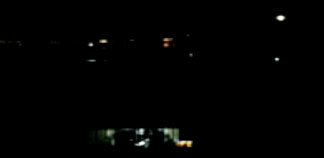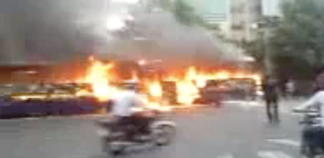به زبان فارسی
PICTORY
LATEST MUSIC
SEARCH
THE END
21-Jun-2009
همه حضار به مواضع اسب فرزند ملت که درارتفاع 20 متری بالاتر از سطح زمین نصب شده بود با چشمانی از حدقه در آمده نگاه میکردند. انگار همگی منتظر حادثه ای در سی امین سالگرد انقلاب بودند. سرانجام اسب فرزند ملت مثل کوه آتشفشانی به خروش آمد. از سوراخ زیر دم ، گلاب به رویتان، کثافتهای دقیقاً کوانتیزه شده و قالبی به بیرون می ریخت و در همان زمان، از همان آلتی که در زیر شکم قرار داشت، شاشیدن اسب فرزند ملت شروع گردید. باران کثافت و ادار اسب از ارتفاع بالا بر سر شرکت کنندگان میریخت و بوی گند آن همه فضای پایتخت و کشور را فرا گرفت. شبکه های خبری بین المللی ، به پخش مستقیم این رویداد پرداختند. مجسمه فرزند ملت وضعیت مضحکی یافته بود. همه اهالی پایتخت بعد از مدتها فرصتی برای خندیدن پیدا کرده بودند. فرزند ملت در جای خود میخکوب و همه یونیفرم شیک و براقش پر از کثافت اسب شده بود>>>
CRISIS
18-Jun-2009 (12 comments)
Ever since the first days of the Islamic Republic there have been two sovereignties in Iran, a divine and a popular. The concept of popular sovereignty, which is derived from the indivisible will of the Iranian nation, is inscribed in Article I of the constitution of the Islamic Republic. And the divine concept of sovereignty is derived from God's will, which, through the medium of Shi'ia institutions of an Imamate, is bestowed on the existing 'faqih' as the rightful ruler of the Shi'ite community, a perception which forms the foundation of the doctrine of the 'Velayat-i-Faqih'. Increasingly, the divine sovereignty has been less about religion than about political theology. As for the popular sovereignty, it has found its due place in the social work and political action of Iranian civil society>>>
OBSERVER
18-Jun-2009 (2 comments)
Dear friends, For the past week or more there have been so many activities and happenings related to the elections here in Iran but I haven’t taken the step to write until now, partially out of uncertainty about whether or not writing would pose any danger and partially because I simply haven’t had time. The past couple of weeks have been intense to say the least, between family parties, gatherings, daily chats, farsi classes, studying and naps during the heat of the day my days have been far fuller than I expected. At leisure I will write you more about those things. For now, I would like to write a little about the current events that have so many of you asking questions>>>
QUESTION
18-Jun-2009 (25 comments)
It is too early now to publicly attack Messrs Khatami and Mousavi, two appalling political fraudsters hoisted on to the placards of masses who for thirty years have suffered under the brutal reign of the Islamic Republic of Iran. It is too early because blood is being spilled by young people whose lives are denied their full expression by the medieval sensibilities of Iran’s ruling clerics. Khatami and Mousavi are, for now, untouchable – to criticise them, judging by the competing emotions on Facebook – is to attack the very demonstrators who are risking their lives for freedom. It is too early to say that these two shining lights are in fact agents of darkness. It is too early because blood is being spilled>>>
CRACK
18-Jun-2009 (3 comments)
برای اولین بار بین دزدانی که رأی ملت را بین خود تقسیم کرده اند اختلاف افتاده و آنهایی که به سهمشان راضی نیستند صدا را به اعتراض بلند کرده اند. طبعاً ظرف مدتی کوتاه سخنان بسیاردر بارهٌ «انجام کودتا» و ... گفته شده که مثل شرکت در رأی گیری بیشتر با احساسات و آرزوهای رأی دهندگان ارتباط دارد تا ارزیابی سنجیدهٌ مطلب. باید از این سخنان گذشت و نگاه را از ورای دودی که شلوغی های اخیر بر پا کرده به تحولات احتمالی وضعیت معطوف نمود. اول نتیجه و تا اینجا مهم ترین نتیجهً کار بی آبرو شدن نمایش انتخاباتی است که به ابتکار نظام و با همکاری و همگامی ساده دلانه و بی مزد و پاداش ایرانیان داخل و خارج به طور ادواری انجام میگرفت. این دروغ را که در ایران «انتخابات نیمه آزاد» وجود دارد و اگر تا جایی اختیار به دست حکومت است از جایی دیگر مردم هم در آن شریک میشوند، افراد پرشماری طی چندین سال تبلیغ کرده اند>>>
POINT
18-Jun-2009 (2 comments)
The 12th of June 2009 saw Iran’s tenth presidential election get underway with Iranians turning out in record numbers. As someone who decided to vote in one of the many polling stations made available for expats across the world, I can say that in the scenes I witnessed, the excitement was palpable; we all felt we were on the cusp of an important step and potential leap forward in the ongoing and painstaking struggle for reform in Iran. While we weren’t unrealistic in our expectations and remained cognizant of the constitutional and political constraints upon the Iranian presidential office, we felt there was great potential for a transformation of Iran’s image and place in the international order>>>
SIDELINES
18-Jun-2009 (one comment)
The first memories I recall of my life are snapshots of our home with the lights out after dusk, loud protests and demonstrations heard from the streets of Tehran, and the huddling around a light bulb with a makeshift cardboard shade plugged into the wall. These were the days that culminated in the 1979 revolution in Iran. The streets were unsafe for children due to violence and there was a relative period of lawlessness at the time of transition. As children, my sister and I sat in the glow of the small light bulb and heard the reassurances of our parents. I remember vividly the conversation that my father had with his childhood friend who was an assistant professor in a university in Isfahan>>>
VIEW
15-Jun-2009 (38 comments)
Large-scale manipulation of Friday's presidential election in Iran was to be expected, but few could have predicted that Iran's supreme leader, Ayatollah Ali Khamenei, had a military coup in mind. By declaring incumbent Mahmoud Ahmadinejad the winner, Khamenei conveyed a clear message to the West: Iran is digging in on its nuclear program, its support to Lebanese Hezbollah and Palestinian Hamas, and its defiant regional policies. In the streets of Tehran and other major cities, riot police, members of the Islamic Revolutionary Guard Corps and Basij militias are battling reformist demonstrators who are protesting the results. The government has cut Internet connections and cellphone service and jammed foreign satellite TV and radio broadcasts>>>
COUP
15-Jun-2009 (5 comments)
The actual results of the 2009 presidential elections in Iran may never be known factually. But the actual tallies of the votes cast may have never had anything to do with anything in the first place. This does not mean that, in the aftermath of the announcement of the election results, the outrage displayed on the streets by the supporters of the reformist candidate Mir-Hossein Mousavi, America's favorite horse in the race, does not indicate real hurt. Those Americans who, to this day, are still bitter about the non-election of Al Gore in the 2000 debacle, can get an idea of the Iranians' sense of betrayal if they take their outrage at the clearly stolen outcome in 2000 and intensify it by a factor of ... oh, about a million>>>
RAFSANJANI
15-Jun-2009
در ایران جنجالی برپاست. مکتوب ها و مرقومه های متعددی رد و بدل شده و نقل است که در بلاد دیگر شب نامه هایی در این خصوص بر منازل مردم افکنده می شود. من که الان نزدیک به هفتاد سال است در کالبد اکبر حلول کرده ام، ایشان را تا این حد مضطرب و پریشان ندیده بودم. سایت ها و روزنامه ها و شبکه های تلویزیونی اجانب موضوع را بیش از حد بزرگ کرده و روغن داغش را زیاد می کنند. من که در این مدت اکبر را به خوبی شناخته ام ، گمانم ایشان در فکر لوس کردن خویش و تعزیز مجددش در پیش مقامات رده بالای کشور است. البته در غیر اهل بودن اولادش هم که هیچ جای تردید نیست. چرا راه دور برویم طبق اسنادی که شما همین الان به راحتی می توانید در اینترنت پیدا کنید، فرزند ناخلف من یعنی جهانگیر شاه، با انگلیسی ها در آمیخت و نرد غلامی باخت>>>
ELECTION
15-Jun-2009 (9 comments)
اصلاحات به معنای نوعی کمک رسانی به حکومت اسلامی پدیده ی تازه ای نیست. از فردای بنیانگذاری این حکومت عده ای از درون و بیرون حکومت به این نوع از کمک رسانی رو آوردند. در این میانه عده ای ضمن حفظ بیضه اسلام و حکومت اسلامی به دنبال ایجاد تغییر اتی سطحی و "سوپاپ اطمینانی" در حکومت بودند , که نمونه اند مهندس بازرگان و نهضت آزادی در یک سو و حزب توده در سوی دیگر. اگر بازرگان و نهضت آزادی و امثالهم با اعتفاد به اسلام جرات نزدیک شدن به بنیاد های فساد را نداشتند و می خواستند کار تغییر را از اضافه کردن کلمه "دموکراتیک" به جمهوری اسلامی آغاز کنند , توده ای ها با هالو پنداشتن آیت الله خمینی تلاش داشتند خط امام را به راه رشد غیر سرمایه داری بکشانند ودر نقش "کارمندان" حکومت اسلامی اصلاحات مورد نظر را بوجود آورند. اما دیدیم آیت الله خمینی چگونه بتدریج و حسابگرانه – و جنایتکارانه – به سراغ این دست از اصلاح طلبان کمک رسان رفت>>>
BAHAI
15-Jun-2009 (12 comments)
The canvas upon which history is painted; the mirror in which one reflects upon the past; the stones on which marks of civilisation are engraved; and the books in which truths are told; all speak of the glory of ancient Persia. The splendour of her past reflects the beauty and elegance with which she has adorned herself in rearing such seers, poets and literary giants as Sa’di, Hafez, Khayyam, Mawlana and more. Surely a civilisation that prided itself with raising such poets and philosophers who touched the entire world with their insight, thoughts and literary prowess, would not have flourished without education. Education is the force behind advancement and the fuel to intellectual empowerment>>>
FRAUD
13-Jun-2009 (5 comments)
در سال ۱۱۴۸ قمری نادرشاه کلیهٔ حکمرانان و کدخدایان ایران را در دشت مغان جمع کرد (بالغ بر ۲۰٬۰۰۰ نفر). او در شورای دشت مغان اعلام کرد که وظایف خود را انجام داده و تصمیم بهاستراحت و کنارهگیری از کارها دارد. بزرگان کشور که میدانستند او باطناً مایل به سلطنت است، وی را به سلطنت پذیرفتند. بدین ترتیب شاه عباس سوم صفوی از شاهی برکنار شده و حکومت سلسلهٔ افشار با پادشاهی نادر آغاز شد. نادر اندکی بعد در ۱۱۴۸ ه.ق. تاجگذاری نمود. شاعری به نام قوام الدین، ماده تاریخ تاجگذاری وی را «الخیر فی ماوقع» سرود که بر روی سکههای دوره افشاریه نیز منقوش گردید. >>>
RECENT COMMENTS
IRANIANS OF THE DAY
| Person | About | Day |
|---|---|---|
| نسرین ستوده: زندانی روز | Dec 04 | |
| Saeed Malekpour: Prisoner of the day | Lawyer says death sentence suspended | Dec 03 |
| Majid Tavakoli: Prisoner of the day | Iterview with mother | Dec 02 |
| احسان نراقی: جامعه شناس و نویسنده ۱۳۰۵-۱۳۹۱ | Dec 02 | |
| Nasrin Sotoudeh: Prisoner of the day | 46 days on hunger strike | Dec 01 |
| Nasrin Sotoudeh: Graffiti | In Barcelona | Nov 30 |
| گوهر عشقی: مادر ستار بهشتی | Nov 30 | |
| Abdollah Momeni: Prisoner of the day | Activist denied leave and family visits for 1.5 years | Nov 30 |
| محمد کلالی: یکی از حمله کنندگان به سفارت ایران در برلین | Nov 29 | |
| Habibollah Golparipour: Prisoner of the day | Kurdish Activist on Death Row | Nov 28 |
















